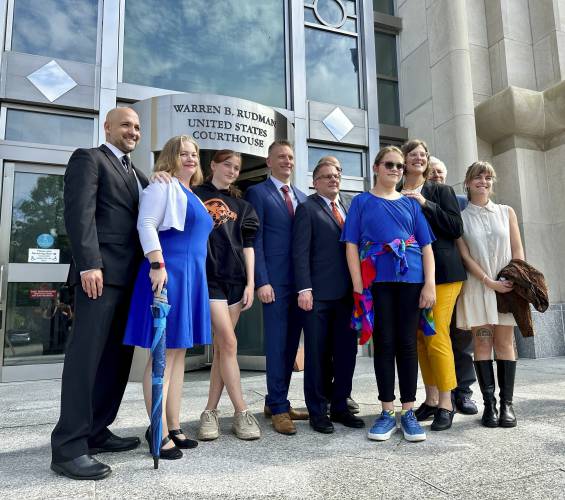Transgender sports ban lawsuit will not be decided until at least late 2025

Two teens challenging New Hampshire's new law banning transgender girls from girls' sports teams, Parker Tirrell and Iris Turmelle, pose with their families and attorneys in Concord, N.H., Monday, Aug. 19, 2024. Holly Ramer/AP photo, file
|
Published: 11-21-2024 2:40 PM
Modified: 11-21-2024 5:51 PM |
A resolution will not come until at least next school year in a lawsuit challenging New Hampshire’s ban on transgender girls’ participation on girls’ sports teams, a federal court judge ruled during a court conference on Thursday.
Lawyers for the two transgender girls who serve as plaintiffs in the case argued that school districts “want clarity” before next school year on the constitutionality of the law, which went into effect in August. They proposed a trial date in July 2025.
Lawyers for the state, however, requested a date in February 2026, arguing that the plaintiffs’ proposed timeline would not give them enough time to conduct pretrial discovery in the case, which will likely involve multiple expert witnesses.
New Hampshire federal court Magistrate Judge Talesha Saint-Marc decided Thursday that the two sides should come to a compromise, but acknowledged that a trial prior to September 2025 was unrealistic.
“I think that a schedule that tries to get this case tried by the beginning of next school year is just too ambitious for this case,” Judge Saint-Marc said.
That trial date will not affect whether the two plaintiffs in the case, Parker Tirrell of Plymouth and Iris Turmelle of Pembroke, can continue participating on girls’ sports teams at their high school. A preliminary injunction granted in September allows them to do so indefinitely.
But it will delay any resolution in the judicial challenge of the law, which bans transgender girls in grades five through 12 from playing on girls’ sports teams in NHIAA-sanctioned sports.
Three students in New Hampshire – Tirrell, Turmelle, and a soccer and track and field athlete at Kearsarge Regional High School – have been publicly identified as transgender girls who wish to play on girls’ sports teams. The Kearsarge district allowed their student to continue playing on her teams even though she did not file a lawsuit.
Article continues after...
Yesterday's Most Read Articles
 Surplus seller Ollie’s enters New Hampshire, opens in Belmont
Surplus seller Ollie’s enters New Hampshire, opens in Belmont
 Riverbend to close adult mental health housing facility in Concord due to funding challenges
Riverbend to close adult mental health housing facility in Concord due to funding challenges
 Celebrating National Ice Cream Day with Richardson’s Farm: ‘Nobody else does what we do’
Celebrating National Ice Cream Day with Richardson’s Farm: ‘Nobody else does what we do’
 City officials reject the work of an outside consultant hired to lead Concord’s diversity initiatives
City officials reject the work of an outside consultant hired to lead Concord’s diversity initiatives
 Affordable townhouse expansion gets green light
Affordable townhouse expansion gets green light
Chris Erchull, the lead lawyer for Tirrell and Turmelle, said following Thursday’s court conference that the lack of other students in legal limbo doesn’t negate school districts’ urgency to have more clarity on the law.
“There’s a lot of confusion right now in the school districts,” Erchull said. “… School boards are in a difficult position for sure: Do we comply with this state law that conflicts with federal law or not?”
Erchull also said Tirrell, a sophomore soccer player at Plymouth Regional High School, and Turmelle, a freshman at Pembroke Academy who had indicated in court filings she intended to join the track team, would also “like resolution of this matter for their own sake.”
Office of the Attorney General Spokesperson Mike Garrity wrote in a statement that the law remains in effect for all transgender girls other than Tirrell and Turmelle.
“This injunction applies only to those two plaintiffs, allowing them to continue participating in sports on teams based on their gender identity, while the statute itself remains valid and enforceable for all others,” Garrity wrote. “… Our office is committed to upholding the rule of law and ensuring that the provisions of HB 1205 are respected.”
His statement did not address what enforcement actions, if any, his office is taking against the Kearsarge Regional School District.
In court, Office of the Attorney General lawyer Michael DeGrandis said that his defense team was just beginning to engage expert witnesses and had yet to retain any so far. He characterized a schedule proposed by plaintiffs that would have the two sides disclose their expert witnesses on the same date as “unrealistic and fundamentally unfair.”
Referring to the bill that passed last spring, DeGrandis also argued that plaintiffs’ decision late last month to ask for a broader ruling, rather than one that just applied to the two plaintiffs, expanded the pre-trial work necessary.
“Now they’re saying that HB1205 under no set of circumstances can prohibit a biological boy from playing on a girls’ sports team. That is a mammoth difference,” he said.
This story has been updated to include a statement from Mike Garrity, the spokesperson for the Office of the Attorney General.







 New Hampshire committee seeks to prevent domestic fatalities like murder-suicide in Berlin
New Hampshire committee seeks to prevent domestic fatalities like murder-suicide in Berlin ‘A little piece of everything I like’: New Pittsfield barbershop brings more than a haircut to downtown
‘A little piece of everything I like’: New Pittsfield barbershop brings more than a haircut to downtown NH judge decides to pause Trump’s birthright citizenship order
NH judge decides to pause Trump’s birthright citizenship order Canterbury honors ‘real heroes’ with updated Military Veterans’ Project
Canterbury honors ‘real heroes’ with updated Military Veterans’ Project
